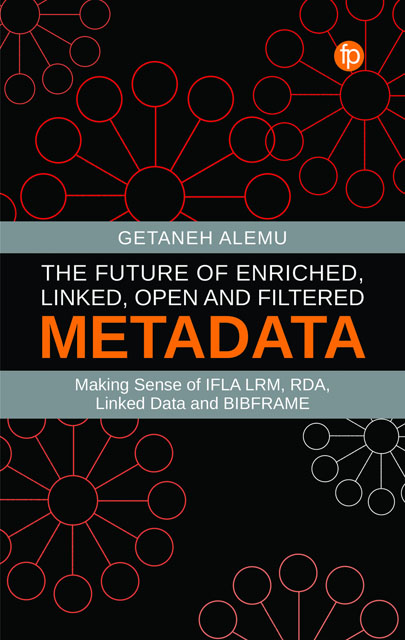 The Future of Enriched, Linked, Open and Filtered Metadata
The Future of Enriched, Linked, Open and Filtered Metadata Book contents
- Frontmatter
- Contents
- Figures
- Tables
- Code snippets
- About the Author
- Preface
- Acknowledgements
- Abbreviations
- 1 Introduction to Metadata
- 2 Metadata Strategies and Quality Indicators
- 3 Metadata Use Cases
- 4 Contemporary Metadata Principles
- 5 Enriched and Linked Metadata
- 6 Open Metadata
- 7 Filtered Metadata
- 8 FRBR, LRM and the Notion of Work
- 9 Resource Description and Access (RDA)
- 10 BIBFRAME: A New Metadata Framework
- 11 Crowdsourcing and User-Generated Metadata
- References
- Index
10 - BIBFRAME: A New Metadata Framework
Published online by Cambridge University Press: 18 November 2022
- Frontmatter
- Contents
- Figures
- Tables
- Code snippets
- About the Author
- Preface
- Acknowledgements
- Abbreviations
- 1 Introduction to Metadata
- 2 Metadata Strategies and Quality Indicators
- 3 Metadata Use Cases
- 4 Contemporary Metadata Principles
- 5 Enriched and Linked Metadata
- 6 Open Metadata
- 7 Filtered Metadata
- 8 FRBR, LRM and the Notion of Work
- 9 Resource Description and Access (RDA)
- 10 BIBFRAME: A New Metadata Framework
- 11 Crowdsourcing and User-Generated Metadata
- References
- Index
Summary
Overview
With the development of the web and the diversity oftextual, audio, video and multimedia informationformats, as well as changing user expectations, camea growing emphasis in libraries and archives ondeveloping new conceptual models and standards –such as FRBR, FRBRoo, FRAD, FRSAD, IFLA LRM and RDA.Library standards such as AACR2 and MARC also cameunder intense scrutiny. RDA replaced AACR2. There isnow a requirement to change MARC for a new dataformat. MARC is insufficient to work in modernlibrary environments and is incompatible with theSemantic Web. The Bibliographic Framework Initiative(BIBFRAME) is a new metadata framework (model)designed by the Library of Congress to replaceMARC.
Its work began in 2011. BIBFRAME promises bettermetadata interoperability, sharing and openness(Park, Richards and Brenza, 2018; Steele, 2019).BIBFRAME aims to be a metadata model that addressesthe limitations and constraints imposed by MARC dueto the latter's incompatibility with the global web.Hence, the rationale for adopting RDF, URI and HTTPprotocols recommended by the World Wide WebConsortium (W3C).
BIBFRAME adopts an entity-relationship model. Itdefines three main classes (entities), includingWork, Instance and Item. It also defines additionalclasses such as Authority, Annotation, Agents,Places and Subjects. Whilst IFLA LRM and RDA defineelaborate entities, they are not opposed toBIBFRAME. However, as Raza (2019) indicates,interoperability challenges exist between thevarious models. The BIBFRAME model is designed tomake library metadata machine-processable,actionable, indexable, discoverable, linkable andreusable. BIBFRAME has gone through variousiterations of development and experimentation by theLibrary of Congress. The first iteration of themodel was called BIBFRAME 1.0, which was laterrevised to BIBFRAME 2.0 ontology. The later versionincluded more classes, properties and terms.However, MARC is still the predominant standard, andno library has fully moved from MARC toBIBFRAME.
What is BIBFRAME?
The main impetus for the development of BIBFRAME comesfrom the MARC standard being anachronistic andoutdated, especially in light of Linked Datadevelopments. According to Park, Richards and Brenza(2018), MARC was not designed to be interoperablewith data that resides outside the library – makingit technically complex for linking and reuse:‘Although many libraries have opened theircatalogues to the world wide web, the informationcontained in each record is still represented as anentire record in itself ‘.
- Type
- Chapter
- Information
- The Future of Enriched, Linked, Open and Filtered MetadataMaking Sense of IFLA LRM, RDA, Linked Data andBIBFRAME, pp. 213 - 236Publisher: FacetPrint publication year: 2022


